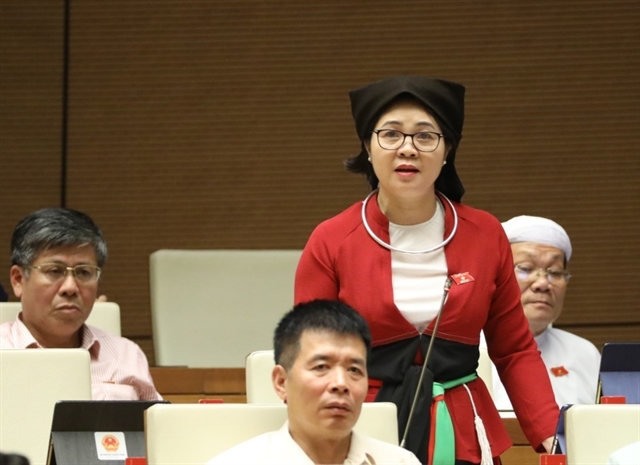 Politics & Law
Politics & Law

 |
| An ethnic minority deputy speaks at a National Assembly discussion. — VNA/VNS Photo |
HÀ NỘI — Affirming that ethnic minorities are an inseparable part of the Vietnamese ethnic community, the Vietnamese Party and State always attach importance to ensuring political, economic and cultural rights and no discrimination against ethnic minorities, including the right to participate in the State political system, especially the country’s top legislature – the National Assembly (NA).
Việt Nam is home to 54 ethnic groups including 53 ethnic minority groups with more than 14 million people, accounting for 14.7 per cent of the country’s population.
The political rights to vote and to run for office are among the basic human rights recognised in the International Convention on the Elimination of All Forms of Racial Discrimination (CERD).
In Việt Nam, the right to participate in elections and run for office is stipulated by the constitution as a basic right and obligation of citizens, including voters of 53 ethnic minorities.
The 1992 Constitution and the 2013 Constitution recognise equality before the law of all Vietnamese citizens, regardless of ethnic minority or majority, race or religion, and without discrimination, including the rights to vote and run for office.
During the elections for NA deputies and People's Councils at all levels, the State and the Việt Nam Fatherland Front have made efforts to ensure the proportion of voters, especially the proportion of National Assembly ethnic minority deputies.
The proportion of NA deputies who are ethnic minorities in recent tenures has always remained high, even higher than in People's Councils at all levels. Many officials from ethnic minority groups have held important positions in the country's leading agencies.
The principle of equality in the election of NA deputies and People's Council deputies has been applied in every stage of the candidacy and election process. Equality in elections is a principle that ensures objectivity and impartiality so that all citizens have the same ability to participate in elections, prohibiting any discrimination in any form.
This principle also requires a reasonable proportion of nominated officials to run for NA deputies, People's Council deputies at all levels, and the number of elected representatives in each locality.
Ethnic minority groups and women must have an appropriate proportion of representatives in the NA and People's Councils.
During his lifetime, President Hồ Chí Minh expressed a special affection for the ethnic minority community. Right after the country gained independence, he wanted all ethnic minorities to have representatives in the National Assembly to represent their groups.
He said: "Kinh or Thổ, Mường or Mán, Gia Rai or Ede, Xơ Đăng or Ba Na and other ethnic minorities, are all descendants of Việt Nam and brothers. We live and die together in any happy or miserable circumstance.”
In the recent election terms, voter turnout in ethnic minority areas has been high. The role of ethnic minority representatives in the state apparatus and political organisations has been enhanced, demonstrating Việt Nam’s efforts in domestically applying the CERD convention and ensuring the political rights of all citizens, including ethnic minorities.
Nguyễn Lâm Thành, deputy chairman of the NA's Council for Ethnic Affairs, said the proportion of ethnic NA deputies has increased significantly through the years, from 34 out 333 deputies (10.2 per cent) at the first term to 89 put of 499 deputies (17.8 per cent) in the 15th tenure between 2021 and 2026.
He said every NA tenure has had representatives from 28 to 32 ethnic groups. To date, a total of 52 out of 54 ethnic groups including the Kinh ethnic group, and 51 out of 53 ethnic minorities have had representatives in the NA throughout history.
Only two ethnic groups, Ơ Đu (population under 1,000 people) and Ngái (population under 2,000) have not had any NA representative. Việt Nam has set the goal of having those two ethnic groups in the NA, he said.
The outcomes show that during recent years, Việt Nam has made various efforts to ensure political rights, including the right to vote and run for election for ethnic minorities, and ensure the appropriate rate of ethnic groups in the NA as well as People's Councils at all levels.
Encouraging ethnic minority engagement in politics
Thành said quality of human resources among ethnic minorities in general is not high. They have not accessed many opportunities for employment at State agencies and political organisations, and as a result few candidates meet the criteria to run for election.
Barriers in social integration due to prejudices and cultural differences make ethnic minority people lack confidence. Some voters are not fully aware of their rights and obligations in elections, and the need for electing representatives at the top legislature.
Thành pointed out that introducing personnel to elected positions and building high quality human resources are important steps to encourage the engagement of ethnic minority groups in the NA.
For officials who have potential, but have not yet met the standards of professional qualifications or political theory, training must be urgently provided but quality must be guaranteed. Ethnic minority officials need to be assigned to take on various important tasks at grassroots levels, he said.
He also emphasised the need to offer training to NA deputy candidates and improving capacity for ethnic minority NA deputies.
He also proposed the State to enforce more specific and appropriate policies to improve the quality of education, especially at high schools in ethnic minority areas. — VNS




